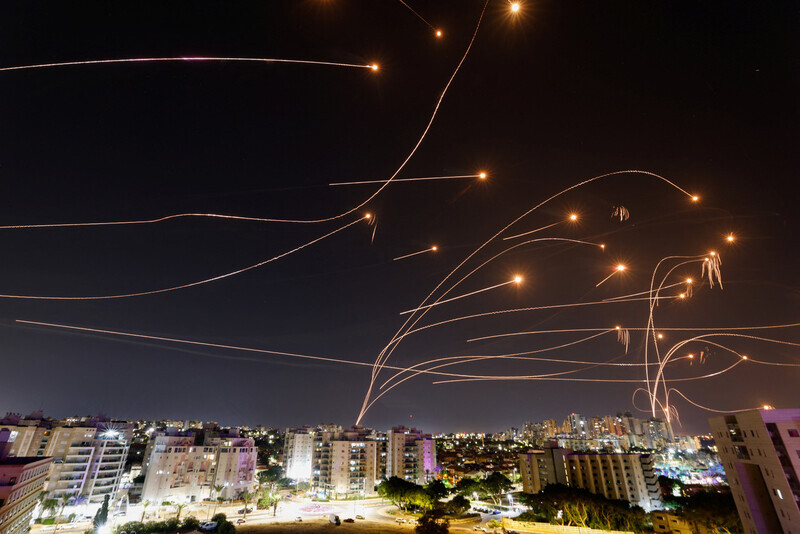hankyoreh
Links to other country sites 다른 나라 사이트 링크
[Column] Imagining life in Korea with rocket alerts


Israel has seen a surge in the use of smartphone apps that give alerts on rocket launches. According to Wired, Israelis’ interest in missile warning apps “surged” after Hamas’ surprise attack on Oct. 7. Users of the Israeli government’s official app alone surged from 600,000 to 2 million, while private apps reportedly have hundreds of thousands of users. Israel has a population of about 9 million. When the apps send out alerts of an attack before public sirens are even wailing, the local population evidently rushes to take shelter in underground bunkers.
On the other hand, the people of Gaza, who are being attacked by Israeli forces from the air and on the ground, are left for dead, not privy to such missile warnings and having no bunkers to which to evacuate, media reports.
Israel boasts some of the world’s most advanced technological prowess, including cybersecurity and autonomous driving. However, as young developers are mobilized for the war against Hamas, Israeli tech companies are reportedly facing a labor shortage.
Some Middle Eastern and South American countries have cut ties or suspended trade with Israel in condemnation of Israel’s bombardment of refugee camps in Gaza. Stocks and currency value plummeted as investors dumped Israeli stocks and money.
Waging war with your neighbors is a vivid reminder that even the most technologically advanced and wealthy nations have a hard time keeping their citizens safe and economically secure.
How did Israeli citizens end up having to use smartphone apps to dodge missiles and be pulled from their coding desks to march into war?
Many agree that Prime Minister Benjamin Netanyahu’s ruthless policies on Palestine and autocratic politics are to blame. Netanyahu’s far-right policies have trampled on the Palestinian people’s right to exist by increasing Israeli settlements on the West Bank and blockading the Gaza Strip.
While Hamas’ brutal provocation cannot be excused, many experts point to Netanyahu’s stubbornness and misjudgment in pushing for an “ideological war” while ignoring public opinion at home and abroad.
In a column for the Hankyoreh, Kim Yeon-chul, who formerly served as South Korea’s minister of unification, analyzed that “the division created by far-right politics in Israel gave Hamas the opportunity to maneuver.”
He also pointed out that the lack of cooperation between various intelligence agencies, including Mossad, due to the lack of communication and unilateralism characteristic of far-right politics, enabled Hamas to launch its surprise attack.
After Russia-Ukraine and Israel-Hamas, the Korean Peninsula, along with Taiwan, has been cited as a “third front” that could place the US in a conundrum.
Between a nuclear North Korea and a South under the US nuclear umbrella, war would mean mutual annihilation. If North Korea is rational, it knows there is nothing to gain from provoking the US or South Korea.
However, diplomatic and security experts worry about contingencies. In a situation where communication between North and South Korea and between North Korea and the US is severed, there is a possibility that a small incident could be misjudged and escalate out of control.
Some analysts have suggested that North Korea could launch a provocation at sea, avoiding inland South Korea in order to refrain from ruffling China's feathers, as around 1 million Chinese live in the country.
As we have seen in the past with the sinking of the ROKS Cheonan and shelling of Yeonpyeong Island, even small-scale military conflicts result in tragic loss of life and economic damage, as demonstrated by the idea of the “Korea discount.”
Still, the Yoon administration’s “ideology” and “peace through strength” policies make it seem as if it is not willing to talk to North Korea, so the public is bound to be anxious.
The role of the press becomes all the more important when politics shifts into ideological overdrive and bellicose rallying cries fill the air. That peace, not war, is the only way forward, that armed clashes always come at a price — readers and viewers need to be reminded of these ideas. This is where the Israeli press failed, and Korea’s press isn’t doing much better.
As an outlet committed to the peaceful reunification of the Korean Peninsula, the Hankyoreh has gone further than any other media in its reporting to actively call for inter-Korean dialogue. But less has been done to scrutinize the Yoon administration about what it calls “practical alternatives” for peace.
At a time when South Korea’s annual military spending eclipses North Korea’s entire GDP, we must carefully examine what “peace through strength” really means. We must also ask how Seoul will secure communication channels that could prevent misjudgments by North Korea and put a lid on an incidental escalation into war.
I don’t want to imagine a life in which we have to walk around with missile warning apps on our phones like in Israel. In fact, were war to break out on the Korean Peninsula, I’m sure we wouldn’t even have time to use them.
Please direct questions or comments to [english@hani.co.kr]

Editorial・opinion
![[Column] Welcome to the president’s pity party [Column] Welcome to the president’s pity party](https://flexible.img.hani.co.kr/flexible/normal/500/300/imgdb/original/2024/0515/3917157400447943.jpg) [Column] Welcome to the president’s pity party
[Column] Welcome to the president’s pity party![[Editorial] Korea must respond firmly to Japan’s attempt to usurp Line [Editorial] Korea must respond firmly to Japan’s attempt to usurp Line](https://flexible.img.hani.co.kr/flexible/normal/500/300/imgdb/original/2024/0514/2317156736305813.jpg) [Editorial] Korea must respond firmly to Japan’s attempt to usurp Line
[Editorial] Korea must respond firmly to Japan’s attempt to usurp Line- [Editorial] Transfers of prosecutors investigating Korea’s first lady send chilling message
- [Column] Will Seoul’s ties with Moscow really recover on their own?
- [Column] Samsung’s ‘lost decade’ and Lee Jae-yong’s mismatched chopsticks
- [Correspondent’s column] The real reason the US is worried about Chinese ‘overcapacity’
- [Editorial] Yoon’s gesture at communication only highlights his reluctance to change
- [Editorial] Perilous stakes of Trump’s rhetoric around US troop pullout from Korea
- [Guest essay] Preventing Korean Peninsula from becoming front line of new cold war
- [Column] The state is back — but is it in business?
Most viewed articles
- 1[Editorial] Korea must respond firmly to Japan’s attempt to usurp Line
- 2[Editorial] Transfers of prosecutors investigating Korea’s first lady send chilling message
- 3[Column] Welcome to the president’s pity party
- 4Second suspect nabbed for gruesome murder of Korean in Thailand, 1 remains at large
- 5Could Korea’s Naver lose control of Line to Japan?
- 6Major personnel shuffle reassigns prosecutors leading investigations into Korea’s first lady
- 7Naver’s union calls for action from government over possible Japanese buyout of Line
- 8Unexpected rate of AI development requires timely discussion of side effects
- 9US has always pulled troops from Korea unilaterally — is Yoon prepared for it to happen again?
- 10China gains 2 new ambassadors to Korea in form of newborn panda cubs